Related Research Articles
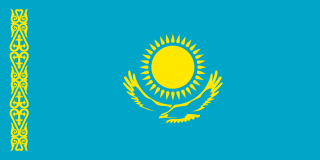
Kazakhstan, officially the Republic of Kazakhstan, is a landlocked country mostly in Central Asia, with a small part in Eastern Europe. It borders Russia to the north and west, China to the east, Kyrgyzstan to the southeast, Uzbekistan to the south, and Turkmenistan to the southwest, with a coastline along the Caspian Sea. Its capital is Astana, while the largest city and leading cultural and commercial hub is Almaty. Kazakhstan is the world's ninth-largest country by land area and the largest landlocked country. It has a population of 20 million and one of the lowest population densities in the world, at fewer than 6 people per square kilometre. Ethnic Kazakhs constitute a majority, while ethnic Russians form a significant minority. Officially secular, Kazakhstan is a Muslim-majority country, although ethnic Russians in the country form a sizeable Christian community.
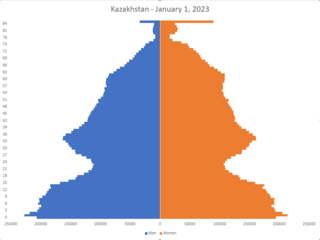
The demographics of Kazakhstan enumerate the demographic features of the population of Kazakhstan, including population growth, population density, ethnicity, education level, health, economic status, religious affiliations, and other aspects of the population. Some use the word Kazakh to refer to the Kazakh ethnic group and language and Kazakhstani to refer to Kazakhstan and its citizens regardless of ethnicity, but it is common to use Kazakh in both senses. It is expected that by 2050, the population will range from 23.5 to 27.7 million people.
Gueorgui Otyrba is an Abkhazian politician and academic. He was the first Human Rights Commissioner of Abkhazia between 2007 and 2016 and acting Foreign Affairs Minister between June and July 2004.

Human rights in Kazakhstan are uniformly described as poor by independent observers. Human Rights Watch says that "Kazakhstan heavily restricts freedom of assembly, speech, and religion. In 2014, authorities closed newspapers, jailed or fined dozens of people after peaceful but unsanctioned protests, and fined or detained worshipers for practicing religion outside state controls. Government critics, including opposition leader Vladimir Kozlov, remained in detention after unfair trials. Torture remains common in places of detention."
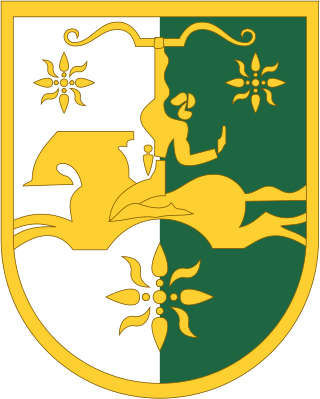
The Government of the Republic of Abkhazia governs the partially recognised Republic of Abkhazia.
The Moscow Bureau for Human Rights is Russian human rights monitoring non-governmental organization, which is headed by Alexander Brod.
Evgeniy Aleksandrovich Zhovtis is a Kazakhstan human rights activist and director of the Kazakhstan International Bureau for Human Rights and Rule of Law.
Maksharip Magometovich Aushev was an Ingush businessman and opposition leader in the Republic of Ingushetia, a federal subject of the Russian Federation. Aushev had taken over the opposition website, Ingushetia.org, after its owner, Magomed Yevloyev, a vocal critic of the Ingush government, was shot and killed while in police custody.

The Socialist Movement of Kazakhstan, previously known as the Socialist Resistance of Kazakhstan from 2006 to 2011, is a banned communist political organisation in Kazakhstan. It is active in a number of cities but operates primarily in Almaty.

The Crew Against Torture is a Russian non-governmental organisation in the field of human rights based in Nizhny Novgorod, Russia. CAT provides assistance to victims of torture and conducts independent investigation of torture cases. In addition, CAT publishes reports on systemic problems regarding the ineffectiveness of official investigations and prosecution of torture in Russia.

Tatyana Nikolayevna Moskalkova is a Russian lawyer, teacher, and politician. She has been Russia's Commissioner for Human Rights since 22 April 2016, succeeding Ella Pamfilova, and is the Deputy of the State Duma of the Federal Assembly of the Russian Federation V and VI convocations.

The Presidential Council for the Development of Civil Society and Human Rights is a consultative body to the President of the Russian Federation, tasked with assisting him in guaranteeing and protecting human rights and freedoms in Russia. Since October 21, 2019, the chairman of the Council has been Valery Fadeyev.
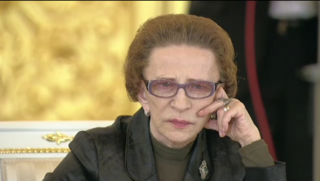
Tamara Georgievna Morshchakova is a Soviet and Russian jurist who served as a judge of the Russian Constitutional Court. Tamara Morshchakova was a member of the Russian Presidential Council for Civil Society and Human Rights until 2019.

The Communist Party of Kazakhstan is a banned political party in Kazakhstan.
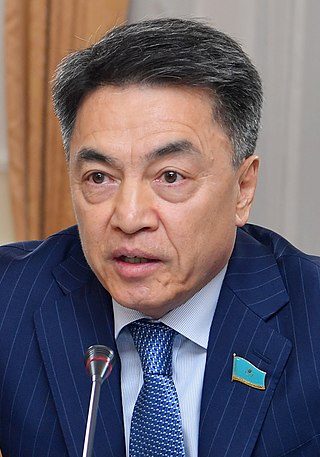
Asqar Orazalyūly Şäkirov is a Kazakh politician who serves as a Chair of the Senate of Kazakhstan since 2 September 2019.

The Abai Square is a city square in Almaty, Kazakhstan. It is named after the Kazakh poet and enlightener Abai Qunanbaiuly whose monument is located in the middle. The square features a public garden and a number of fountains clad in granite. The square is located in front of the Palace of the Republic and around it are the Hotel Kazakhstan, Arman cinema, and a cable station linking to the Kók Tóbe Park.

Commissioner for Human Rights in the Russian Federation is an official appointed by the State Duma, the lower house of the Federal Assembly of Russia, to consider complaints of Russian and foreign citizens and stateless persons on Russia's territory of against decisions or actions of state bodies and officials.
Erzhan Elshibayev is a labor rights activist from Kazakhstan. In March, 2019, Elshibayev was arrested for allegedly starting a fight. He was later sentenced to five years in prison.
Marat Tolegenuly Zhylanbayev is a Kazakhstani long-distance runner, human rights activist and politician. As an athlete, Zhylanbayev became known for running Ultramarathons across the largest deserts in Asia, Africa, Australia and the Americas. After starting his political career in local politics in the city of Ekibastuz from the late 1990s, Zhylanbayev became more widely known as an activist following the 2022 Kazakh unrest, when he attempted to officially register his own political party, Alga, Kazakhstan!. In May 2023 he was arrested and charged with "financing extremist activities" and "participating in a banned extremist organisation"; he has since been described as a political prisoner by Radio Free Europe/Radio Liberty and Human Rights Watch.
Duman Almasuly Mukhammedkarim is a Kazakhstani journalist. After decades working for the Qazaqstan Radio and Television Corporation, he founded his own YouTube channel, Ne Deidi, in 2015, from which he covered significant events in Kazakhstan, including most notably the January Events. In 2023, Mukhammedkarim was arrested and detained multiple times over a three-month period, and since June 2023 has been detained under charges of funding and participating in extremist activities, which human rights organisations have described as "dubious" and a "gross violation" of his human rights.
References
- ↑ Kazakh: Адам құқықтары мен заңдылықты сақтау жөніндегі Қазақстан халықаралық бюросы, romanized: Adam quqıqtarı men zañdılıqtı saqtaw jönindegi Qazaqstan xalıqaralıq byurosı, AQmZSJQXB; Russian: Казахстанское международное бюро по правам человека и соблюдению законности, romanized: Kazakhstanskoye mezhdunarodnoye byuro po pravam cheloveka i soblyudeniyu zakonnosti, KMBPCh
- 1 2 3 "Kazakhstan International Bureau for Human Rights and the Rule of Law (KIBHR)". World Organisation Against Torture . Archived from the original on 23 September 2023. Retrieved 3 March 2024.
- 1 2 "Kazakhstan International Bureau for Human Rights and Rule of Law (KIBHR)". FORUM-ASIA. Archived from the original on 17 April 2019. Retrieved 3 March 2024.
- ↑ "Казахстанское международное бюро по правам человека и соблюдению законности: 20 лет на страже прав человека" [Kazakhstan International Bureau for Human Rights and Rule of Law: 20 years of guarding human rights]. Pravo i SMI Tsentralnoy Azii (in Russian). 11 July 2013. Archived from the original on 22 September 2020. Retrieved 3 March 2024.
- ↑ Amanzholova, B. A.; Polyanskaya, A. Y. (2015). "Уголовно-правовой аспект характеристики преступлений совершенных по мотиву настиональной, расовой, религиозной ненависти" [Criminal legal aspect of the characteristics of crimes committed on national, racial, and religious hatred]. Nauchnaya Diskussiya (in Russian). 8 (36): 66–70. Retrieved 3 March 2024– via eLibrary.Ru.
- ↑ Aliyeva, I. Z. (2012). "Права ребенка в законодательных ахтах Республики Казахстан" [Rights of the child in the legislative acts of the Republic of Kazakhstan]. Prava Cheloveka Kak Vyssheye Dostoyaniye Chelovechstva (in Russian): 386–390 – via eLibrary.ru.
- ↑ "Новый международной бюро FIDH избран на 38-м конгрессе в Стамбуле" [New FIDH International Bureau elected at the 38th Congress in Istanbul]. International Federation for Human Rights (in Russian). 27 May 2013. Archived from the original on 22 February 2015. Retrieved 3 March 2024.
- ↑ "Қазақстан 2020: Адам құқықтары жөніндегі баяндама" [Kazakhstan 2020: report on human rights]. U.S. Embassy and Consulate in Kazakhstan (in Kazakh). 31 March 2021. Archived from the original on 31 May 2023. Retrieved 3 March 2024.
- ↑ "Kazakhstan: Joint Statement on January 2022 events". Human Rights Watch . 29 July 2022. Archived from the original on 18 January 2024. Retrieved 3 March 2024.
- ↑ Kamalova, Nozima; Vitaliev, Vitaly; Shields, Akeisha, eds. (2006). Ugrozy, napadki, aresty i pritesneniya, kotorym podvergayutsya pravozashchitniki [Threats, attacks, arrests and harassment, to which human rights defenders are subjected](PDF) (in Russian). Dublin: Front Line Defenders. ISBN 0-9547883-4-6. Archived from the original (PDF) on 22 October 2012. Retrieved 3 March 2024.
- ↑ Balaeva, Anna (17 August 2005). "Заявление Казахстанского международного бюро по правам человека и соблюдению законности" [Statement by the Kazakhstan International Bureau of Human Rights and Rule of Law]. ZONAKZ (in Russian). Archived from the original on 3 March 2024. Retrieved 3 March 2024.
- ↑ "Казахстан: Правозащитник Евгений Жовтис приговорен к четырем годам тюрьмы" [Kazakhstan: human rights activist Yevgeny Zhovits sentenced to four years in prison]. Fergana (in Russian). 3 September 2009. Archived from the original on 4 March 2016. Retrieved 3 March 2024.
- ↑ "Kazakhstan: Review Rights Defender's Harsh Sentence". Human Rights Watch . 3 September 2009. Archived from the original on 16 August 2016. Retrieved 3 March 2024.
- ↑ Soz, Adil (23 March 2012). "Editor Igor Vinyavsky released". IFEX . Archived from the original on 20 October 2020. Retrieved 3 March 2024.
- ↑ "Unprecedented crackdown on human rights organisations in Kazakhstan". Front Line Defenders . 29 January 2021. Archived from the original on 9 December 2023. Retrieved 3 March 2024.